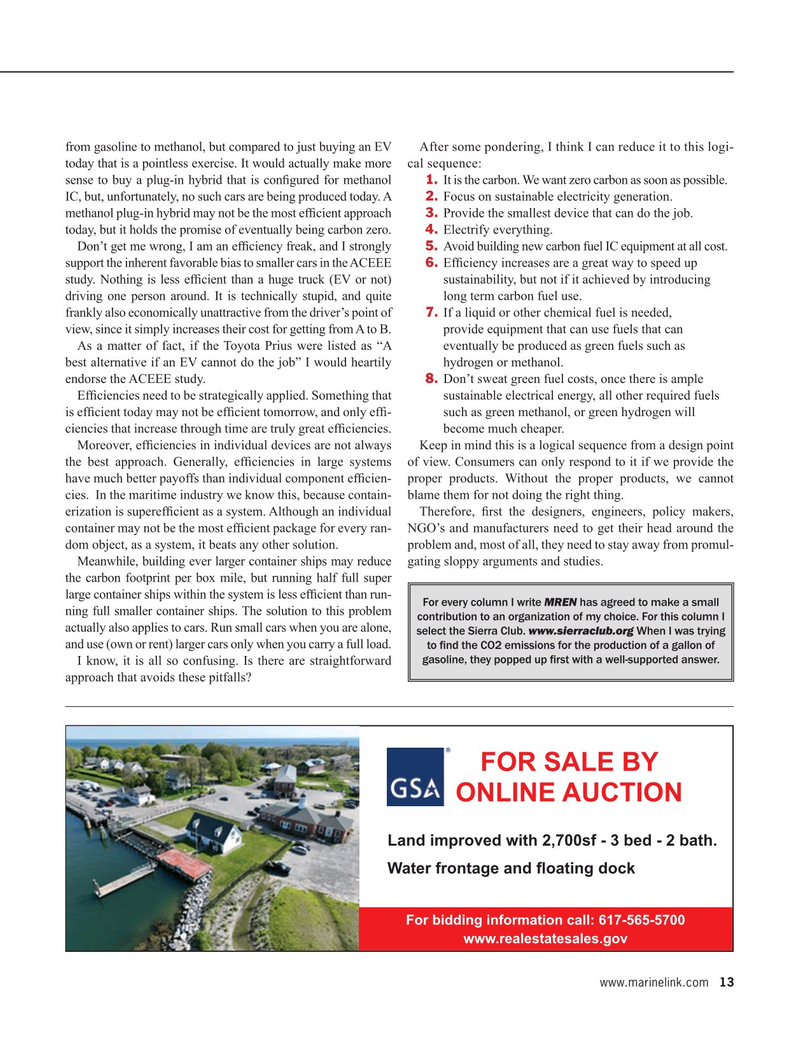
Page 13: of Maritime Reporter Magazine (April 2024)
Read this page in Pdf, Flash or Html5 edition of April 2024 Maritime Reporter Magazine
from gasoline to methanol, but compared to just buying an EV After some pondering, I think I can reduce it to this logi- today that is a pointless exercise. It would actually make more cal sequence: sense to buy a plug-in hybrid that is con? gured for methanol It is the carbon. We want zero carbon as soon as possible. 1.
IC, but, unfortunately, no such cars are being produced today. A Focus on sustainable electricity generation.2. methanol plug-in hybrid may not be the most ef? cient approach Provide the smallest device that can do the job.3. today, but it holds the promise of eventually being carbon zero. Electrify everything.4.
Don’t get me wrong, I am an ef? ciency freak, and I strongly Avoid building new carbon fuel IC equipment at all cost.5. support the inherent favorable bias to smaller cars in the ACEEE Ef? ciency increases are a great way to speed up 6. study. Nothing is less ef? cient than a huge truck (EV or not) sustainability, but not if it achieved by introducing driving one person around. It is technically stupid, and quite long term carbon fuel use.
frankly also economically unattractive from the driver’s point of If a liquid or other chemical fuel is needed, 7. view, since it simply increases their cost for getting from A to B. provide equipment that can use fuels that can
As a matter of fact, if the Toyota Prius were listed as “A eventually be produced as green fuels such as best alternative if an EV cannot do the job” I would heartily hydrogen or methanol. endorse the ACEEE study. Don’t sweat green fuel costs, once there is ample 8.
Ef? ciencies need to be strategically applied. Something that sustainable electrical energy, all other required fuels is ef? cient today may not be ef? cient tomorrow, and only ef? - such as green methanol, or green hydrogen will ciencies that increase through time are truly great ef? ciencies. become much cheaper.
Moreover, ef? ciencies in individual devices are not always Keep in mind this is a logical sequence from a design point the best approach. Generally, ef? ciencies in large systems of view. Consumers can only respond to it if we provide the have much better payoffs than individual component ef? cien- proper products. Without the proper products, we cannot cies. In the maritime industry we know this, because contain- blame them for not doing the right thing. erization is superef? cient as a system. Although an individual Therefore, ? rst the designers, engineers, policy makers, container may not be the most ef? cient package for every ran- NGO’s and manufacturers need to get their head around the dom object, as a system, it beats any other solution. problem and, most of all, they need to stay away from promul-
Meanwhile, building ever larger container ships may reduce gating sloppy arguments and studies. the carbon footprint per box mile, but running half full super large container ships within the system is less ef? cient than run-
For every column I write MREN has agreed to make a small ning full smaller container ships. The solution to this problem contribution to an organization of my choice. For this column I actually also applies to cars. Run small cars when you are alone, select the Sierra Club. www.sierraclub.org When I was trying and use (own or rent) larger cars only when you carry a full load. to ? nd the CO2 emissions for the production of a gallon of gasoline, they popped up ? rst with a well-supported answer.
I know, it is all so confusing. Is there are straightforward approach that avoids these pitfalls?
FOR SALE BY
ONLINE AUCTION
Land improved with 2,700sf - 3 bed - 2 bath.
Water frontage and À oating dock
For bidding information call: 617-565-5700 www.realestatesales.gov www.marinelink.com 13
MR #4 (1-17).indd 13 4/5/2024 9:42:01 AM

 12
12

 14
14
